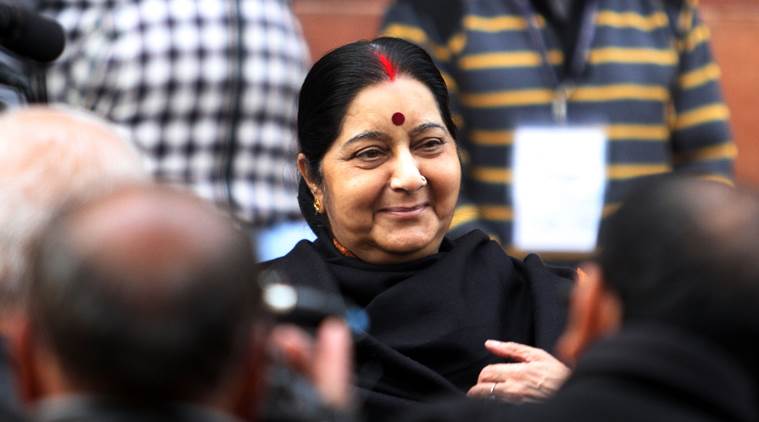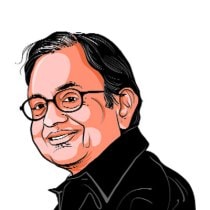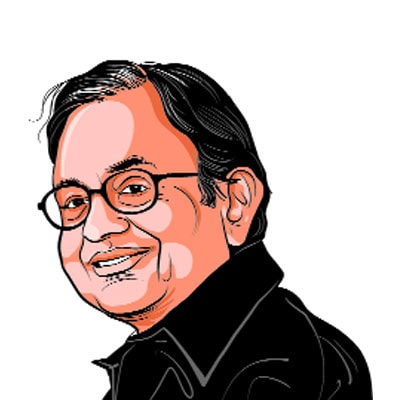Su-raj (good governance) and Ms Swaraj
During the last four years, mobs of both kinds — the one, on the ground, and the other, in the virtual world, have grown in number and size.

Ms Swaraj, along with Mr L K Advani, had resisted the rise of Mr Narendra Modi but lost. After the election. (Express photo by Prem Nath Pandey /File)
There are two kinds of mobs — one, on the ground, and the other, in the virtual world. Both share the same characteristics. The members of the crowd take cover under anonymity. They pretend to be offended or injured. They singularly lack the courage to own their actions or words. They believe they are citizens of the Republic of Impunity.
During the last four years, mobs of both kinds have grown in number and size. In the real world, mobs have assaulted girls wearing jeans and couples in a park or bar. They lynched Mohammad Akhlaq for having meat in his home (Dadri, UP) and Pehlu Khan for carrying cattle to his dairy farm (Alwar, Haryana). They stripped and beat Dalit boys at Una, Gujarat. There are more examples from Assam, Jharkhand, Maharashtra, West Bengal etc, where the victims were usually Muslims or Dalits or nomads.
In recent months, mobs, egged on by rumours, have killed people suspected to be child-lifters. One of them, Sukanta Chakraborty, was a young man appointed by the authorities in Sabroom, Tripura, to quell rumour-mongering!
In the virtual world, the mob is not very different. They have a name: trolls. They are intolerant, rude, coarse, vulgar and violent. Their weapons are hate speech and fake news. They may not kill, but I suspect that many of them, if he or she was part of a violent mob in the real world, would not hesitate to do so.
Lonely Ms Swaraj
One such mob launched into Ms Sushma Swaraj, the Minister of External Affairs, recently. She has been a member of the BJP (and its predecessor, the Jan Sangh) for as long as she has been in public life. She is educated, urbane and articulate. She takes particular care to identify herself with the BJP’s image of an ideal Hindu Indian woman. She has won many elections. During 2009-2014, she was the leader of opposition in the Lok Sabha — a position that in a parliamentary democracy should have made her the natural choice to be prime minister if her party won the election.
The BJP won the election in 2014, but an outsider with tremendous energy and political skill had already stormed his way to become the leader of the party and, therefore, Prime Minister.
Ms Swaraj, along with Mr L K Advani, had resisted the rise of Mr Narendra Modibut lost. After the election,
Ms Swaraj fought a lonely battle to find an honourable place in the new government and was ultimately accommodated as Minister of External Affairs — but with little say in the conduct of foreign policy, which had been taken over by the Prime Minister’s Office.
Swaraj Invents Role
The smart Ms Swaraj invented a role for herself — champion of the little person who was stranded in a foreign country or had been abducted/imprisoned or denied a passport/visa or required admission to an Indian university/hospital and so on. Apparently, there was a need for such a Good Samaritan and the people seemed to love her benevolence. It also helped that she scrupulously avoided confrontation with opposition parties.
Suddenly, one routine act of kindness landed her in trouble. An inter-faith couple found it difficult to get their passports and tweeted their grievance.
Ms Swaraj, or one of her staff, responded and directed the Passport Office to issue the passports. The officer who had allegedly denied the passports was transferred pending an enquiry — perhaps an over-reaction, but certainly without any malice. All hell broke loose in the Twitter world. Ms Swaraj was trolled as no BJP leader had been. It became obvious that the trolls belonged to the same army that is routinely unleashed every day against opposition leaders. Anyone who has read Swati Chaturvedi’s I Am A Troll knows who they are and how they are funded. Ms Swaraj’s fault was that she did not take note of the troll army until they targeted her.
Shock and Silence
Ms Swaraj decided to play victim. She ‘liked’ some tweets, re-tweeted them, and asked for a vote on how many people supported the trolls. To her shock, I suppose, though 57 per cent sympathised with her, 43 per cent supported the trolls! The point of the story is that, during the entire unsavoury controversy, not one fellow minister or party functionary made a statement condemning the trolls! Many days later, the Home Minister revealed that he had spoken to Ms Swaraj and told her that the trolls were “wrong” but that she should not have taken them seriously! It is obvious that trolls are the new pracharaks: they are mobilised to serve one or two leaders (all others are expendable), are ‘followed’ by senior BJP leaders, and nobody will dare to offend them.
Really, Mr Home Minister, should we not take the trolls seriously? By the same yardstick, I suppose, we should not take the moral police, the love-jehadis, the cow protection vigilantes and the lynch mobs seriously.
Trolls and the abuse of social media mark a new low in the breakdown of civil society, law and order, and the justice-delivery system. Action, not words, is required to put down this verbal violence, especially death or rape threats. Unfortunately, there is no action; there are not even words, said promptly and sincerely, by those holding high constitutional offices.
Website: pchidambaram.in @Pchidambaram_IN
For all the latest Opinion News, download Indian Express App
More From P Chidambaram
- Across the aisle: Calculate price of a trade warIt is in India’s interests to be one of the adults in the room and stand up for an open trade order. True, India is…
- Across the aisle: The remains of the dayWhen the political parties demanded a ceasefire for the Ramzan month, the Chief of Army Staff had taken upon himself the responsibility of answering the…
- Searching for Shangri-LaThe world’s leaders hear the Prime Minister and applaud his appeal to embrace diversity; and then they read about happenings in Dadri (Mohammed Akhlaq); Alwar…








































No hay comentarios:
Publicar un comentario